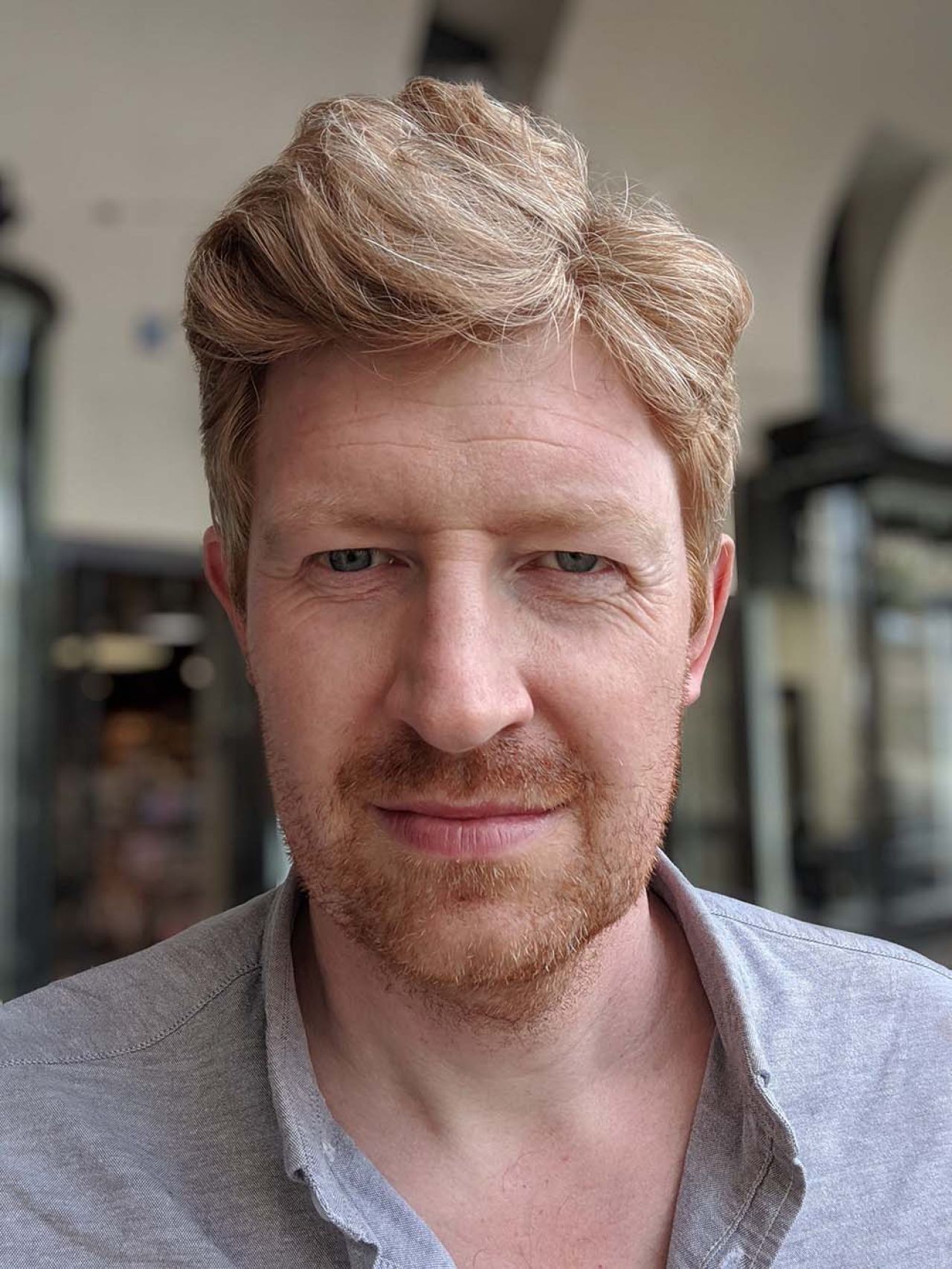Wellbeing in the Arts: founder Adam Bambrough on nurturing mental health in the creative industries
The actor-turned-advocate has made big strides in tackling mental health challenges in the creative profession. We chatted with him about his own journey and why he founded the support organisation Wellbeing in the Arts.

Adam Bambrough
The world of arts and entertainment often conjures images of glamour, applause, validation and creative fulfilment. Yet behind the curtain, a less visible struggle persists, one that Adam Bambrough knows all too well.
As an actor-turned-mental health advocate, Adam's personal experiences have shaped his mission to transform how the creative industries approach employee well-being. This culminated in 2021 in his founding of Wellbeing in the Arts, which provides mental health and well-being support to individuals and organisations in the creative industries in the UK.
Based in London, Wellbeing in the Arts helps those who work in theatre, film, TV, music, literature, dance, opera, fashion, museums, galleries, libraries, gaming, architecture, crafts, design, publishing, advertising and marketing.
I chatted to Adam about how it came about, what it can offer people working today, and the broader issue of supporting mental health in today's creative industries.
From centre stage to behind the scenes
For 15 years, Adam trod the boards as a theatre actor in London. To the outside world, his career appeared to be on an upward trajectory. Indeed, his last stage performance in 2011 garnered the best reviews of his career. However, the reality backstage painted a starkly different picture.
"I was really struggling with severe depression, suicidal thoughts and was filled with anxiety," Adam reveals. "For the last show I did, a comedy called Alternative by Trent Burton, I had reasonable billing in London's West End. But I couldn't have been more miserable. Every night in the wings, I'd think, 'The last thing I want to do is go on this stage. I'd love just to run out of this building and be gone.'"
This internal conflict between outward success and inner turmoil is a familiar narrative for many in the creative industries. For Adam, it was compounded by undiagnosed neurodivergence. It wasn't until 2022 and 2023, well into adulthood, that he received diagnoses of ADHD and autism, respectively.
"Looking back on my life, it makes a lot of sense," he reflects. "But when I was struggling with depression and anxiety from age 18 onwards, I had no idea what these things were. The world of mental health was very different then."
Despite the challenges, Adam found that acting provided a temporary escape from his mental health struggles. "It was stronger than any drug to be on stage," he explains. "It felt like a place I could escape the mental health stuff I was struggling with. But about an hour after coming offstage, that fall would hit me: the realisation that I'm back to my normal life."
From acting to charity
After leaving acting, Adam took the first job he could find, running a small theatre charity in Covent Garden. This role opened his eyes to the widespread nature of mental health struggles within the creative community.
"I travelled around the UK, meeting people who were struggling financially, all of whom worked in the arts," he recalls. "They couldn't feed their children, pay rent or clothe themselves. What was really interesting was how many people had underlying, often undiagnosed, mental health issues. Their stories resonated deeply with my own."
Adam estimates he met around 3,000 people during his time at the charity. And a common thread emerged: fear of discussing mental health with employers, concerns about job security, and frustration with long NHS waiting lists for mental health treatment. Private counselling, meanwhile, felt financially out of reach for many.

Image licensed via Adobe Stock
These experiences compelled Adam to act. Initially, he planned to write a book showcasing individual stories of mental health in the arts, along with resources for support. However, his research revealed such a glaring gap in mental health services for the sector it set him on a new path,
"My ADHD kicked in," Adam says with a laugh. "And I thought, 'Okay, well, let's go address the problem now instead of writing about it later.'" And thus, in 2021, Wellbeing in the Arts was born.
Building the organisation
Adam's approach to founding the organisation was characteristically creative. "If I have a talent in life, it's my imagination," he muses. When I've been really struggling, my imagination has taken me out of the present into a future that was nicer."
Harnessing what he describes as the "superpower" of ADHD hyperfocus, Adam crafted a business plan over a week in a coffee shop. "It just felt like I'd absorbed all this information, and it was almost cathartic for me as well, channelling all my own experiences," he explains.
Of course, translating ideas into practice came with its challenges. "When we started to put some of it into practice, there were so many hiccups at the beginning," Adam admits. "You try something and think, 'Okay, that didn't work at all, but that part of it works.' Then, we'd take that part and build upon it. Slowly, over the two years, it evolved to a place now where we know what we do and how we do it."
Today, Wellbeing in the Arts offers a range of services, including counselling, coaching, on-set well-being practitioners, workshops and mental health first aid training. It works with over 135 counsellors across the UK, all with backgrounds in the creative industries.
"This is one of the big things I picked up from speaking to people," Adam emphasises. "Having counsellors who understand the industry has proved really important."
Unique funding model
One of the most striking aspects of Wellbeing in the Arts is its funding model. Unlike many non-profits, it operates without private funding or grants. Instead, the organisation has developed a sustainable approach that makes mental health support more accessible to creatives while compensating counsellors fairly.
Individuals can self-refer and access support at reduced rates: £15 per session with student counsellors for low-level issues or £45 per session with fully qualified, experienced counsellors. These rates are significantly lower than typical private therapy costs, which can run £60-90 or more per session.
Wellbeing in the Arts achieves this by taking a small percentage of each counselling fee, which allows them to cover operational costs. They also work with creative organisations to provide subsidised support for staff and project-based teams.
"We offer two levels of counselling," Adam explains. "People can self-refer to our system and access support themselves, covering the costs themselves. Or we work with various organisations, who'll subsidise or fully cover the cost of their staff accessing support."

Image licensed via Adobe Stock
This model not only makes therapy more financially accessible but also maintains a degree of separation between individuals and their employers.
"Ninety per cent of people I meet still don't want to talk to employers about their mental health," Adam points out. "That's where Wellbeing in the Arts has connected well because we're one step removed from employers. People feel they can come and talk to us about the support we provide so much more openly than they would with employers."
Supporting the whole industry
While the stereotype of the 'tortured artist' might be the first to come to mind when thinking about mental health in creative fields, Adam stresses that support is needed at all levels of the industry. This includes those in administrative roles, technical positions, and perhaps most notably, those in leadership positions.
"Post-COVID, it's become incredibly difficult to run an organisation," Adam observes. "Leaders feel like they're being expected to do more with fewer resources. There's a lot more pressure. So you might have somebody at the top of the pyramid who has many people below them, but nobody supports them, and they're holding it all together. It's impacting their mental health."
Recognising this need, Wellbeing in the Arts is developing initiatives specifically aimed at supporting arts leaders' mental health and well-being. This holistic approach reflects Adam's belief that mental health support benefits not just individuals but the entire creative ecosystem.
"I see it as an investment," he asserts. "If you look after the people who work for you, you just get a great return. When you invest in people, you find productivity goes up, creativity goes up, and you cut down on the number of people on sick leave because of mental health issues."
Changing the conversation
While big strides have been made in mental health awareness, Adam believes there's still work to be done. He notes a generational shift in attitudes, with younger professionals generally more comfortable discussing mental health. However, this can sometimes clash with more traditional management styles.
"We have a lot of organisations run by people from an older generation who look at mental health quite differently," Adam explains. "It's often been said to us, 'Well, in my day, we just put up with that and got on with it.' Meanwhile, the younger generation is becoming more aware and vocal about what they need."
However, Adam advocates for open dialogue and proactive approaches to mental health in the workplace regardless of age group. "I'm a big believer that the more we talk about this stuff, the better it is for everybody," he says. "It's good for us as individuals and makes for a more enjoyable and better industry."
Plus, he emphasises the importance of raising awareness and providing clear pathways to support. Consequently, Wellbeing in the Arts ensures that people can access counselling or coaching within a week of reaching out.
"It's really difficult for many people to reach out when they're struggling," Adam notes. "And then not to get a response, or to be told you've got a long wait, can be just so disheartening."
Plans for the future
In just two years, Wellbeing in the Arts has made a significant impact, helping over 1,000 people access mental health support in the past 12 months alone. But for Adam, the work is far from over.
"There are still all kinds of horrors on a daily basis," he says, referencing ongoing issues of bullying, harassment, racism and sexism within the industry. "There's a lot of work to do around the environments we create for people to work in; how we can make those healthier and happier."
Despite the challenges, Adam remains optimistic about the future of mental health support in the creative industries. His personal journey from struggling actor to mental health advocate serves as a powerful reminder of the potential for positive change.
"The key point is to let people know, if you're struggling, you're not alone," Adam emphasises. "Other people are accessing support, so there's no reason you shouldn't if you're struggling."
Through Wellbeing in the Arts, Adam is working to ensure that the next generation of creative professionals has the support he wished for during his own struggles. In doing so, he's helping to rewrite the narrative around mental health in the arts, one where seeking help is not a sign of weakness but a vital part of nurturing creativity and building a more compassionate industry.




 by Tüpokompanii](https://www.creativeboom.com/upload/articles/58/58684538770fb5b428dc1882f7a732f153500153_732.jpg)

 using <a href="https://www.ohnotype.co/fonts/obviously" target="_blank">Obviously</a> by Oh No Type Co., Art Director, Brand & Creative—Spotify](https://www.creativeboom.com/upload/articles/6e/6ed31eddc26fa563f213fc76d6993dab9231ffe4_732.jpg)

















